Unit 11 How was your school trip ?Section A 2d-3b 课件(38张PPT)
文档属性
| 名称 | Unit 11 How was your school trip ?Section A 2d-3b 课件(38张PPT) | 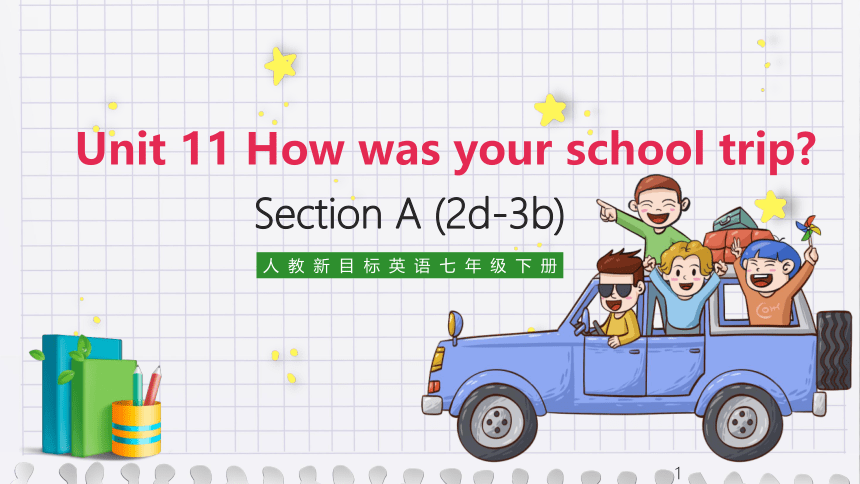 | |
| 格式 | pptx | ||
| 文件大小 | 3.6MB | ||
| 资源类型 | 教案 | ||
| 版本资源 | 人教新目标(Go for it)版 | ||
| 科目 | 英语 | ||
| 更新时间 | 2021-04-10 17:00:10 | ||
图片预览

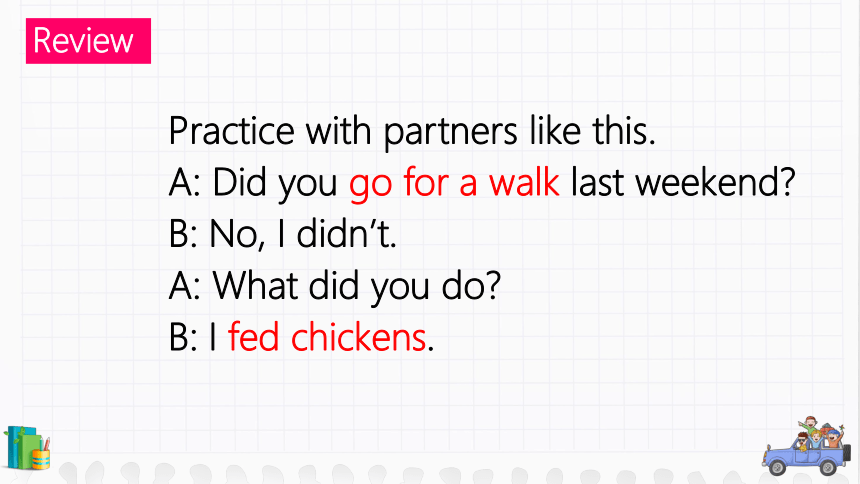
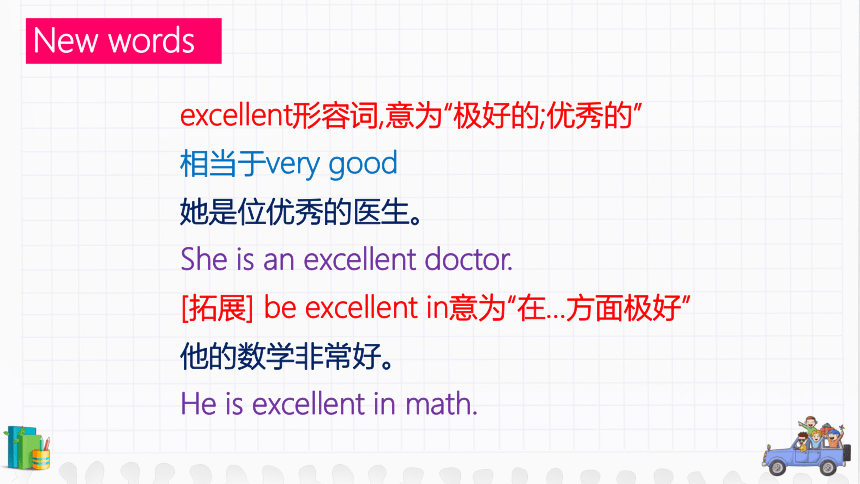
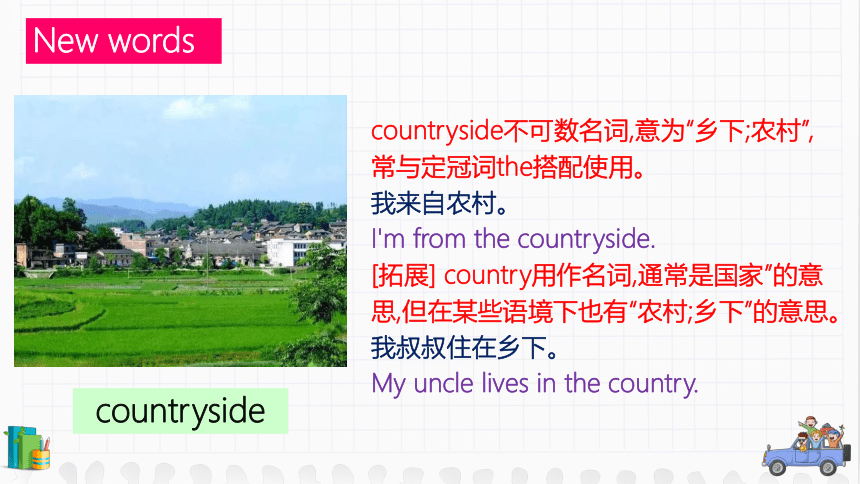
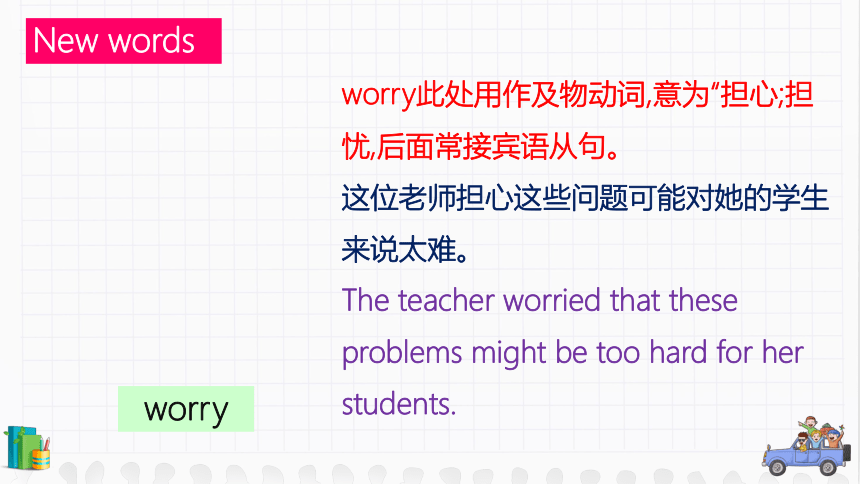
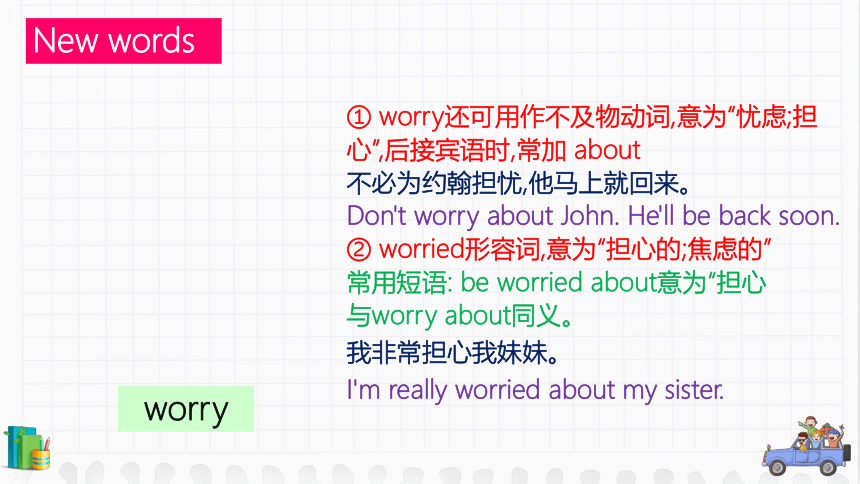
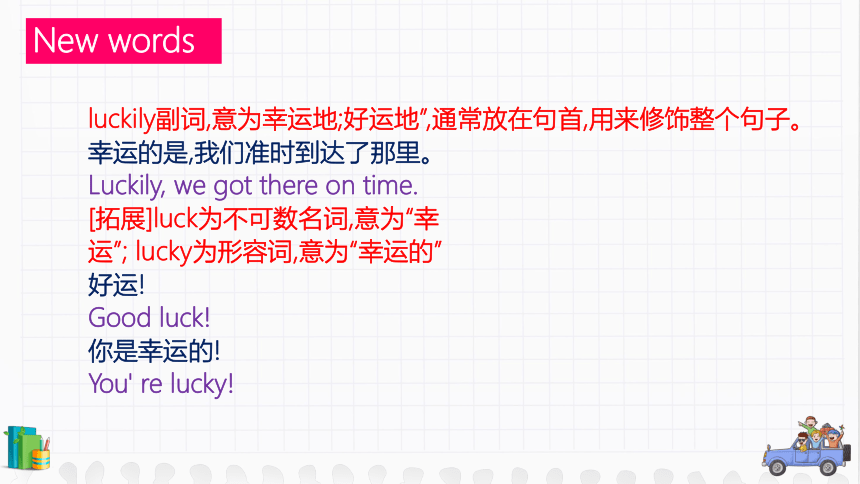
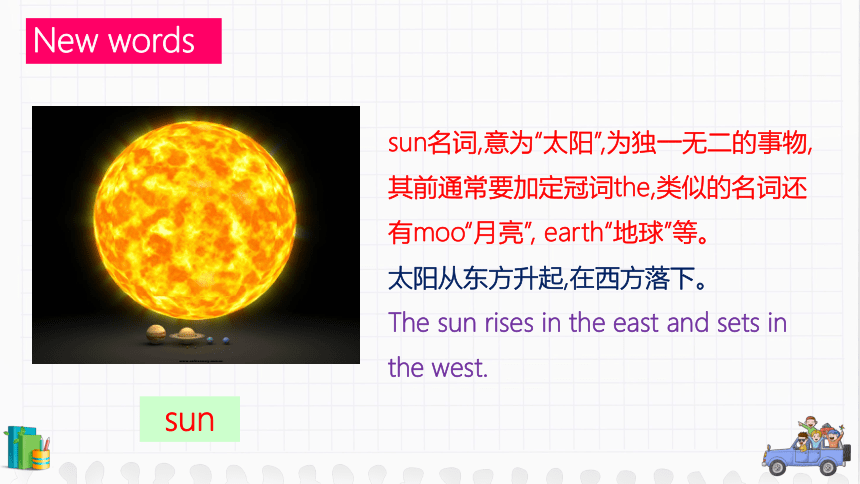
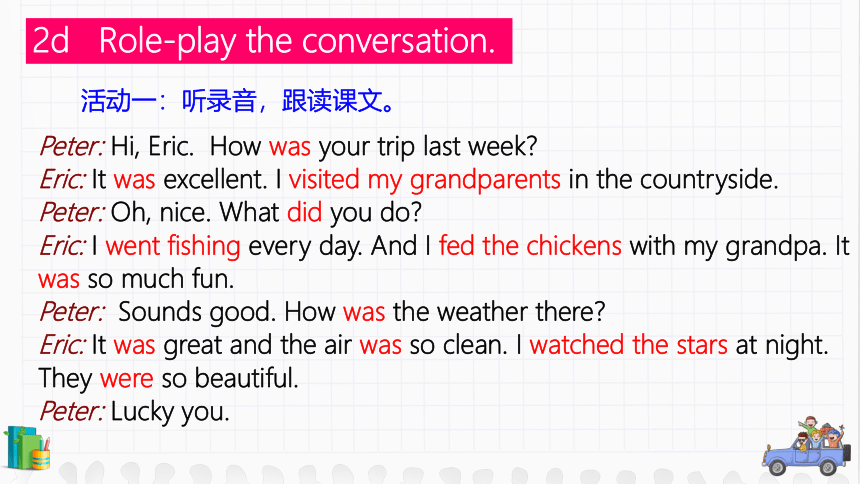
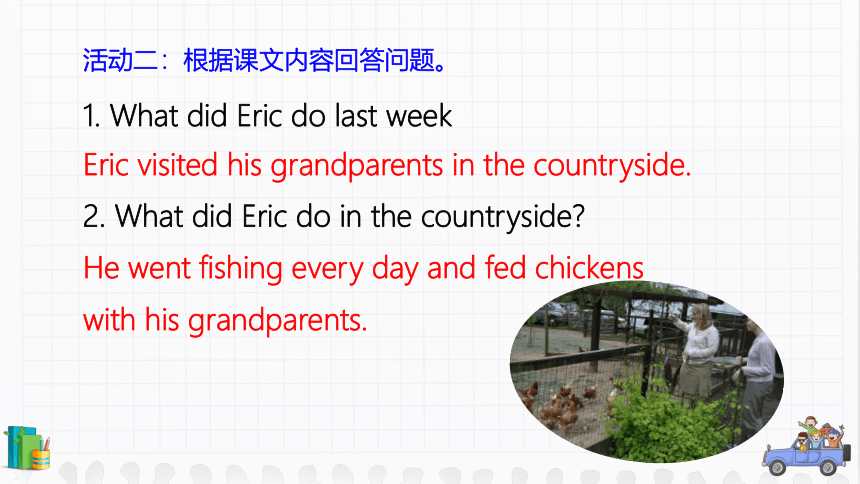
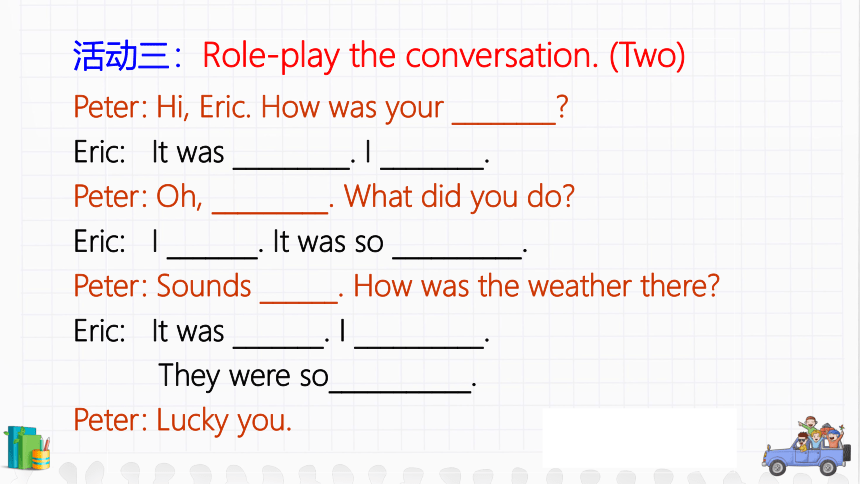
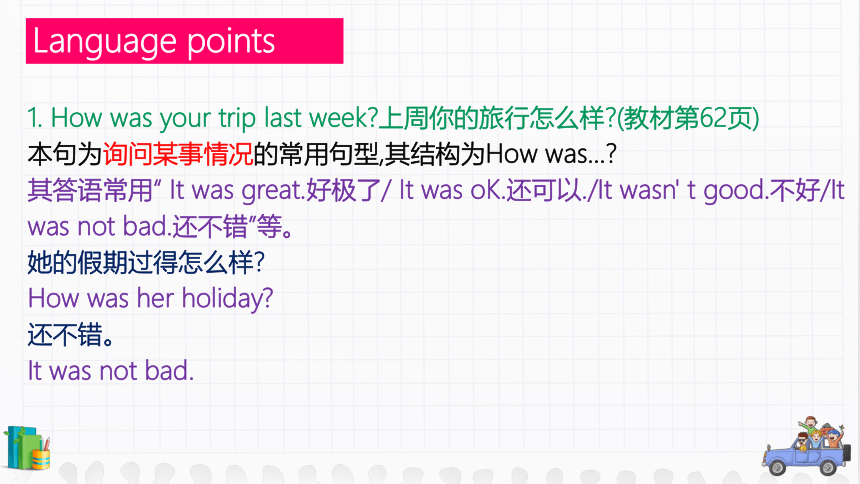
文档简介
Unit 11 How was your school trip?
Section A (2d-3b)
人教新目标英语七年级下册
Practice with partners like this.
A: Did you go for a walk last weekend?
B: No, I didn’t.
A: What did you do?
B: I fed chickens.
Review
excellent形容词,意为“极好的;优秀的”
相当于very good
她是位优秀的医生。
She is an excellent doctor.
[拓展] be excellent in意为“在…方面极好”
他的数学非常好。
He is excellent in math.
New words
countryside
countryside不可数名词,意为“乡下;农村”,常与定冠词the搭配使用。
我来自农村。
I'm from the countryside.
[拓展] country用作名词,通常是国家”的意思,但在某些语境下也有“农村;乡下”的意思。
我叔叔住在乡下。
My uncle lives in the country.
New words
worry
worry此处用作及物动词,意为“担心;担忧,后面常接宾语从句。
这位老师担心这些问题可能对她的学生来说太难。
The teacher worried that these problems might be too hard for her students.
New words
① worry还可用作不及物动词,意为“忧虑;担心”,后接宾语时,常加 about
不必为约翰担忧,他马上就回来。
Don't worry about John. He'll be back soon.
② worried形容词,意为“担心的;焦虑的”
常用短语: be worried about意为“担心
与worry about同义。
我非常担心我妹妹。
I'm really worried about my sister.
New words
worry
luckily副词,意为幸运地;好运地”,通常放在句首,用来修饰整个句子。
幸运的是,我们准时到达了那里。
Luckily, we got there on time.
[拓展]luck为不可数名词,意为“幸
运”; lucky为形容词,意为“幸运的”
好运!
Good luck!
你是幸运的!
You' re lucky!
New words
sun
sun名词,意为“太阳”,为独一无二的事物,其前通常要加定冠词the,类似的名词还有moo“月亮”, earth“地球”等。
太阳从东方升起,在西方落下。
The sun rises in the east and sets in the west.
New words
Peter: Hi, Eric. How was your trip last week?
Eric: It was excellent. I visited my grandparents in the countryside.
Peter: Oh, nice. What did you do?
Eric: I went fishing every day. And I fed the chickens with my grandpa. It was so much fun.
Peter: Sounds good. How was the weather there?
Eric: It was great and the air was so clean. I watched the stars at night. They were so beautiful.
Peter: Lucky you.
0
活动一:听录音,跟读课文。
2d Role-play the conversation.
活动二:根据课文内容回答问题。
1. What did Eric do last week
Eric visited his grandparents in the countryside.
2. What did Eric do in the countryside?
He went fishing every day and fed chickens with his grandparents.
Peter: Hi, Eric. How was your ________?
Eric: It was _________. I ________.
Peter: Oh, _________. What did you do?
Eric: I _______. It was so __________.
Peter: Sounds ______. How was the weather there?
Eric: It was _______. I __________.
They were so___________.
Peter: Lucky you.
活动三:Role-play the conversation. (Two)
1. How was your trip last week?上周你的旅行怎么样?(教材第62页)
本句为询问某事情况的常用句型,其结构为How was...?
其答语常用“ It was great.好极了/ It was oK.还可以./It wasn' t good.不好/It was not bad.还不错”等。
她的假期过得怎么样?
How was her holiday?
还不错。
It was not bad.
Language points
2. It was so much fun那真是挺好玩的。(教材第62页)
(1) so much意为“如此多;这么多”,一般用于修饰不可数名词或动词。
教室里太吵了。
There was so much noise in the classroom.
你说得太多了。
You talked so much.
[拓展] so many“这么多;如此多”,常用来修饰可数名词复数
在这个城市里,他有这么多朋友。
He had so many friends in the city.
Language points
(2)fun此处用作不可数名词,意为“乐趣;开心;有趣的人或事”,其前常用 great,much, a lot of等修饰,用来加强语气。
滑冰是件很有趣的事。
Skating is great fun.
[拓展]① have fun意为“玩得开心”,相当于have a good time
我的爷爷很开心地在钓鱼。
My grandfather has fun in fishing.
②在美式英语中fun可用作形容词,意为“有趣的;愉快的”
我们的英语老师经常把课讲得很有趣。
Our English teacher often makes the classes fun.
Language points
3. It was great, and the air was so clean天气好极了,空气是那么于净。
clean此处用作形容词,意为“清洁的;干净的”,其反义词为dirty脏的”
我们必须保持教室干净。
We must keep our classroom clean.
[拓展] clean还可用作动词,意为“打扫;把弄干净”
常构成短语: clean up“打扫(或清除)干净”。
我们离开学校之前打扫了教室.
We cleaned up the classroom before we left our school.
Language points
一般过去时
1. 用法:
1)表示过去某个时间或某一段时间内发生的动作或存在的状态。
我爸爸去年在上海工作。
My father worked in Shanghai last year.
2)表示过去经常或反复发生的动作。
去年他总是乘公共汽车去上学。
He always went to school by bus last year.
Grammar
2. 一般过去时标志词:
yesterday,a moment ago(刚才), yesterday morning, last night/week, the day before yesterday(前天), Just now(刚才),in+过去的时间(如in1980)等。
上个月我买了一块漂亮的手表。
I bought a beautiful watch last month.
Grammar
3.一般过去时的句式构成
(1)含be的一般过去时的句式
①肯定句:主语+ was/were+其他
我们上周的学校旅行很糟糕。
Our school trip was terrible last week.
②否定句:主语+ was not(或 wasn't)/were not(或 weren't)+其他
昨天我不在家。
I wasn' t at home yesterday.
Grammar
③一般疑问句:Was/Were+主语+其他?
肯定回答用“Yes,主语+was/were.
否定回答用“No,主语+wasn't/ weren't.
昨天你在家吗?
Were you at home yesterday?
不,我不在家。
No, I wasn't.
④特殊疑问句:疑问词+was/were+主语+其他?
你的假期怎么样?
How was your vacation?
Grammar
(2)含实义动词的一般过去时的句式
①肯定句:主语+动词过去式+其他
他们昨天玩得很开心。
They had a good time yesterday.
②否定句:主语 did not(或didn?t)+动词原形+其他
昨天晚上他们没看电视。
They didnt watch TV last night.
Grammar
③一般疑问句:Did主语+动词原形+其他?
肯定回答用“Yes,主语+did:”;否定回答用“No,主语+didn?t”。
昨天你去公园了吗?
Did you go to the park yesterday?
是的,我去了。/不,我没去。
Yes . I did./ No. I didn't
④特殊疑问句:疑问词+dd+主语+动词原形+其他?
你是什么时候做完家庭作业的?
What time did you finish your homework?
Grammar
dance-danced
arrive-arrived
stop-stopped
plan-planned
worry-worried
cry-cried
pick-picked
climb-climbed
一般情况在动词原形后加-ed
以字母e 结尾的动词,只加-d
末尾只有一个辅音字母的重读闭音节动词,先双写这个辅音字母,再加-ed
以“ 辅音字母+y ”结尾的动词,把y 改为i,再加-ed
4. 规则动词过去式的变化
规则动词过去式词尾-ed的读音
读音规则
读 音
例 词
在浊辅音和元音后面
/d/
moved /mu:vd/
在清辅音后面
/t/
passed /pa:st/
在t, d 后面
/ it /
/id/
needed /'ni:did/
(2)不规则动词的过去式变化各异,没有统一的规则,但也并非一点儿规律没有,下面介绍部分动词过去式的记忆规律
①动词过去式与动词原形一样
let→let,put→put,cut→cut
②遇见i改为a
swim→swam,sing→sang, begin→began
③过去式以 ought和 aught结尾的单词
bring→ brought, buy→ bought, think → thought, teach→ taught
Grammar
④中间去e末尾加t
feel→ felt, keep→ kept, sleep → slept, sweep→ swept
⑤把i变为o
ride→rode,dive→ drove,write→ wrote
⑥ow/aw变为ew
know→knew,grow→grew, throw→ threw, draw→ drew
⑦以d结尾的词,把d变成t,如
build→ built,lend→ lent,send→sent,spend→ spent
⑧be的过去式有两种形式,主语是第一、三人称单数用was,其他用 were
Grammar
Adventures(大冒险)
1. Last week she ___ (have) fun on a farm.
2. They _______ (climb) the mountains two days ago.
3. She never ____ (go) to the zoo in the past.
4. I _______ (buy) some books yesterday.
5. We _______(are) happy in those days.
6. I _____ (like) playing in the river during my childhood.
7. I _____(eat) an apple for breakfast this morning.
8. Look! They ___________(pick) apples over there.
had
climbed
went
bought
were
liked
ate
are picking
9. (Do) he (take) the medicine just now?
10. I (find) my lost watch yesterday.
11. When we were young, the teacher (tell) us that the sun
(rise) in the east.
12. I (want) (go ) shopping yesterday, but I (do).
He often (play) chess with his grandpa on weekends.
(Do) Mike (read) English every day?
Sometimes he (lose) his way home.
take
Did
found
told
rises
wanted
to go
didn’t
loses
Does
read
plays
Adventures(大冒险)
Dear Bill,
How _____ (is) your school trip yesterday?
_____ (do) you _____ (go) to the zoo?
_____ (do) you take any photos? _____ (do)
you _____ (see) any interesting animals? I
_____ (go) to the zoo last year and it _____
(is) a lot of fun.
Jim
was
Did
go
Did
Did
see
went
was
Adventures(大冒险)
Dear Jim,
①My school trip ___ (is) great! ② We ___ (have) so much fun! ③We ____ (go) to Green Park. ④We _______ (climb) the mountains there and ____ (see) a lot of flowers. ⑤We ___ (eat) our lunch under some trees and ______ (play) some games after that. ⑥ But at about two o’clock, it ____ (get) very cloudy and we _______ (worry) it would rain. ⑦Luckily, it _____ (do not), and the sun _____ (come) out again! ⑧ We really (enjoy) ourselves that day .
⑨ I (think) we can (have) this kind of trip again some time.
Bill
was
had
went
climbed
saw
ate
played
worried
got
didn’t
came
enjoyed
think
have
1. … we worried it would rain……我们担心将下雨。(教材第63页)
本句为含有宾语从句的主从复合句。
主句中worried为worry的过去式,从句中 would为will的过去式。
在含有宾语从句的主从复合句中,如果主句的时态为一般过去时,从句要用相应的过去时态。
他告诉我他那时正在读书。
He told me he was reading a book at that time.
Language points
(3) come out意为“出来”,其中out为副词
太阳就要出来了。
The sun is coming out.
[拓展] come out的其他含义
①(花)开放
花儿开始开放。
The flowers begin to come out.
②出版;发表
他的第一本书于2003年出版了。
His first book came out in 2003.
Language points
Make up a story. Each student adds a sentence.
Last week I visited ...
The weather was ....
We went fishing…
Pair-work
Ask and answer questions
as many as you can according to the photos.
Examples:
Were /was…?
Did …?
How was/were …?
How/What did …
…
Our new foreign teacher Sam wants to know some past events(过去的事件)of our class. Please choose one topic to introduce to him.
Hints(提示)for you :
When?
Who?
What?
How did you feel?
1.熟记动词变过去式的规则。
2. Write down what your family did last night and how you felt.
Homework
Section A (2d-3b)
人教新目标英语七年级下册
Practice with partners like this.
A: Did you go for a walk last weekend?
B: No, I didn’t.
A: What did you do?
B: I fed chickens.
Review
excellent形容词,意为“极好的;优秀的”
相当于very good
她是位优秀的医生。
She is an excellent doctor.
[拓展] be excellent in意为“在…方面极好”
他的数学非常好。
He is excellent in math.
New words
countryside
countryside不可数名词,意为“乡下;农村”,常与定冠词the搭配使用。
我来自农村。
I'm from the countryside.
[拓展] country用作名词,通常是国家”的意思,但在某些语境下也有“农村;乡下”的意思。
我叔叔住在乡下。
My uncle lives in the country.
New words
worry
worry此处用作及物动词,意为“担心;担忧,后面常接宾语从句。
这位老师担心这些问题可能对她的学生来说太难。
The teacher worried that these problems might be too hard for her students.
New words
① worry还可用作不及物动词,意为“忧虑;担心”,后接宾语时,常加 about
不必为约翰担忧,他马上就回来。
Don't worry about John. He'll be back soon.
② worried形容词,意为“担心的;焦虑的”
常用短语: be worried about意为“担心
与worry about同义。
我非常担心我妹妹。
I'm really worried about my sister.
New words
worry
luckily副词,意为幸运地;好运地”,通常放在句首,用来修饰整个句子。
幸运的是,我们准时到达了那里。
Luckily, we got there on time.
[拓展]luck为不可数名词,意为“幸
运”; lucky为形容词,意为“幸运的”
好运!
Good luck!
你是幸运的!
You' re lucky!
New words
sun
sun名词,意为“太阳”,为独一无二的事物,其前通常要加定冠词the,类似的名词还有moo“月亮”, earth“地球”等。
太阳从东方升起,在西方落下。
The sun rises in the east and sets in the west.
New words
Peter: Hi, Eric. How was your trip last week?
Eric: It was excellent. I visited my grandparents in the countryside.
Peter: Oh, nice. What did you do?
Eric: I went fishing every day. And I fed the chickens with my grandpa. It was so much fun.
Peter: Sounds good. How was the weather there?
Eric: It was great and the air was so clean. I watched the stars at night. They were so beautiful.
Peter: Lucky you.
0
活动一:听录音,跟读课文。
2d Role-play the conversation.
活动二:根据课文内容回答问题。
1. What did Eric do last week
Eric visited his grandparents in the countryside.
2. What did Eric do in the countryside?
He went fishing every day and fed chickens with his grandparents.
Peter: Hi, Eric. How was your ________?
Eric: It was _________. I ________.
Peter: Oh, _________. What did you do?
Eric: I _______. It was so __________.
Peter: Sounds ______. How was the weather there?
Eric: It was _______. I __________.
They were so___________.
Peter: Lucky you.
活动三:Role-play the conversation. (Two)
1. How was your trip last week?上周你的旅行怎么样?(教材第62页)
本句为询问某事情况的常用句型,其结构为How was...?
其答语常用“ It was great.好极了/ It was oK.还可以./It wasn' t good.不好/It was not bad.还不错”等。
她的假期过得怎么样?
How was her holiday?
还不错。
It was not bad.
Language points
2. It was so much fun那真是挺好玩的。(教材第62页)
(1) so much意为“如此多;这么多”,一般用于修饰不可数名词或动词。
教室里太吵了。
There was so much noise in the classroom.
你说得太多了。
You talked so much.
[拓展] so many“这么多;如此多”,常用来修饰可数名词复数
在这个城市里,他有这么多朋友。
He had so many friends in the city.
Language points
(2)fun此处用作不可数名词,意为“乐趣;开心;有趣的人或事”,其前常用 great,much, a lot of等修饰,用来加强语气。
滑冰是件很有趣的事。
Skating is great fun.
[拓展]① have fun意为“玩得开心”,相当于have a good time
我的爷爷很开心地在钓鱼。
My grandfather has fun in fishing.
②在美式英语中fun可用作形容词,意为“有趣的;愉快的”
我们的英语老师经常把课讲得很有趣。
Our English teacher often makes the classes fun.
Language points
3. It was great, and the air was so clean天气好极了,空气是那么于净。
clean此处用作形容词,意为“清洁的;干净的”,其反义词为dirty脏的”
我们必须保持教室干净。
We must keep our classroom clean.
[拓展] clean还可用作动词,意为“打扫;把弄干净”
常构成短语: clean up“打扫(或清除)干净”。
我们离开学校之前打扫了教室.
We cleaned up the classroom before we left our school.
Language points
一般过去时
1. 用法:
1)表示过去某个时间或某一段时间内发生的动作或存在的状态。
我爸爸去年在上海工作。
My father worked in Shanghai last year.
2)表示过去经常或反复发生的动作。
去年他总是乘公共汽车去上学。
He always went to school by bus last year.
Grammar
2. 一般过去时标志词:
yesterday,a moment ago(刚才), yesterday morning, last night/week, the day before yesterday(前天), Just now(刚才),in+过去的时间(如in1980)等。
上个月我买了一块漂亮的手表。
I bought a beautiful watch last month.
Grammar
3.一般过去时的句式构成
(1)含be的一般过去时的句式
①肯定句:主语+ was/were+其他
我们上周的学校旅行很糟糕。
Our school trip was terrible last week.
②否定句:主语+ was not(或 wasn't)/were not(或 weren't)+其他
昨天我不在家。
I wasn' t at home yesterday.
Grammar
③一般疑问句:Was/Were+主语+其他?
肯定回答用“Yes,主语+was/were.
否定回答用“No,主语+wasn't/ weren't.
昨天你在家吗?
Were you at home yesterday?
不,我不在家。
No, I wasn't.
④特殊疑问句:疑问词+was/were+主语+其他?
你的假期怎么样?
How was your vacation?
Grammar
(2)含实义动词的一般过去时的句式
①肯定句:主语+动词过去式+其他
他们昨天玩得很开心。
They had a good time yesterday.
②否定句:主语 did not(或didn?t)+动词原形+其他
昨天晚上他们没看电视。
They didnt watch TV last night.
Grammar
③一般疑问句:Did主语+动词原形+其他?
肯定回答用“Yes,主语+did:”;否定回答用“No,主语+didn?t”。
昨天你去公园了吗?
Did you go to the park yesterday?
是的,我去了。/不,我没去。
Yes . I did./ No. I didn't
④特殊疑问句:疑问词+dd+主语+动词原形+其他?
你是什么时候做完家庭作业的?
What time did you finish your homework?
Grammar
dance-danced
arrive-arrived
stop-stopped
plan-planned
worry-worried
cry-cried
pick-picked
climb-climbed
一般情况在动词原形后加-ed
以字母e 结尾的动词,只加-d
末尾只有一个辅音字母的重读闭音节动词,先双写这个辅音字母,再加-ed
以“ 辅音字母+y ”结尾的动词,把y 改为i,再加-ed
4. 规则动词过去式的变化
规则动词过去式词尾-ed的读音
读音规则
读 音
例 词
在浊辅音和元音后面
/d/
moved /mu:vd/
在清辅音后面
/t/
passed /pa:st/
在t, d 后面
/ it /
/id/
needed /'ni:did/
(2)不规则动词的过去式变化各异,没有统一的规则,但也并非一点儿规律没有,下面介绍部分动词过去式的记忆规律
①动词过去式与动词原形一样
let→let,put→put,cut→cut
②遇见i改为a
swim→swam,sing→sang, begin→began
③过去式以 ought和 aught结尾的单词
bring→ brought, buy→ bought, think → thought, teach→ taught
Grammar
④中间去e末尾加t
feel→ felt, keep→ kept, sleep → slept, sweep→ swept
⑤把i变为o
ride→rode,dive→ drove,write→ wrote
⑥ow/aw变为ew
know→knew,grow→grew, throw→ threw, draw→ drew
⑦以d结尾的词,把d变成t,如
build→ built,lend→ lent,send→sent,spend→ spent
⑧be的过去式有两种形式,主语是第一、三人称单数用was,其他用 were
Grammar
Adventures(大冒险)
1. Last week she ___ (have) fun on a farm.
2. They _______ (climb) the mountains two days ago.
3. She never ____ (go) to the zoo in the past.
4. I _______ (buy) some books yesterday.
5. We _______(are) happy in those days.
6. I _____ (like) playing in the river during my childhood.
7. I _____(eat) an apple for breakfast this morning.
8. Look! They ___________(pick) apples over there.
had
climbed
went
bought
were
liked
ate
are picking
9. (Do) he (take) the medicine just now?
10. I (find) my lost watch yesterday.
11. When we were young, the teacher (tell) us that the sun
(rise) in the east.
12. I (want) (go ) shopping yesterday, but I (do).
He often (play) chess with his grandpa on weekends.
(Do) Mike (read) English every day?
Sometimes he (lose) his way home.
take
Did
found
told
rises
wanted
to go
didn’t
loses
Does
read
plays
Adventures(大冒险)
Dear Bill,
How _____ (is) your school trip yesterday?
_____ (do) you _____ (go) to the zoo?
_____ (do) you take any photos? _____ (do)
you _____ (see) any interesting animals? I
_____ (go) to the zoo last year and it _____
(is) a lot of fun.
Jim
was
Did
go
Did
Did
see
went
was
Adventures(大冒险)
Dear Jim,
①My school trip ___ (is) great! ② We ___ (have) so much fun! ③We ____ (go) to Green Park. ④We _______ (climb) the mountains there and ____ (see) a lot of flowers. ⑤We ___ (eat) our lunch under some trees and ______ (play) some games after that. ⑥ But at about two o’clock, it ____ (get) very cloudy and we _______ (worry) it would rain. ⑦Luckily, it _____ (do not), and the sun _____ (come) out again! ⑧ We really (enjoy) ourselves that day .
⑨ I (think) we can (have) this kind of trip again some time.
Bill
was
had
went
climbed
saw
ate
played
worried
got
didn’t
came
enjoyed
think
have
1. … we worried it would rain……我们担心将下雨。(教材第63页)
本句为含有宾语从句的主从复合句。
主句中worried为worry的过去式,从句中 would为will的过去式。
在含有宾语从句的主从复合句中,如果主句的时态为一般过去时,从句要用相应的过去时态。
他告诉我他那时正在读书。
He told me he was reading a book at that time.
Language points
(3) come out意为“出来”,其中out为副词
太阳就要出来了。
The sun is coming out.
[拓展] come out的其他含义
①(花)开放
花儿开始开放。
The flowers begin to come out.
②出版;发表
他的第一本书于2003年出版了。
His first book came out in 2003.
Language points
Make up a story. Each student adds a sentence.
Last week I visited ...
The weather was ....
We went fishing…
Pair-work
Ask and answer questions
as many as you can according to the photos.
Examples:
Were /was…?
Did …?
How was/were …?
How/What did …
…
Our new foreign teacher Sam wants to know some past events(过去的事件)of our class. Please choose one topic to introduce to him.
Hints(提示)for you :
When?
Who?
What?
How did you feel?
1.熟记动词变过去式的规则。
2. Write down what your family did last night and how you felt.
Homework
同课章节目录
- Unit 1 Can you play the guitar?
- Section A
- Section B
- Unit 2 What time do you go to school?
- Section A
- Section B
- Unit 3 How do you get to school?
- Section A
- Section B
- Unit 4 Don't eat in class.
- Section A
- Section B
- Unit 5 Why do you like pandas?
- Section A
- Section B
- Unit 6 I'm watching TV.
- Section A
- Section B
- Review of Units 1-6
- Unit 7 It's raining!
- Section A
- Section B
- Unit 8 Is there a post office near here?
- Section A
- Section B
- Unit 9 What does he look like?
- Section A
- Section B
- Unit 10 I'd like some noodles.
- Section A
- Section B
- Unit 11 How was your school trip?
- Section A
- Section B
- Unit 12 What did you do last weekend?
- Section A
- Section B
